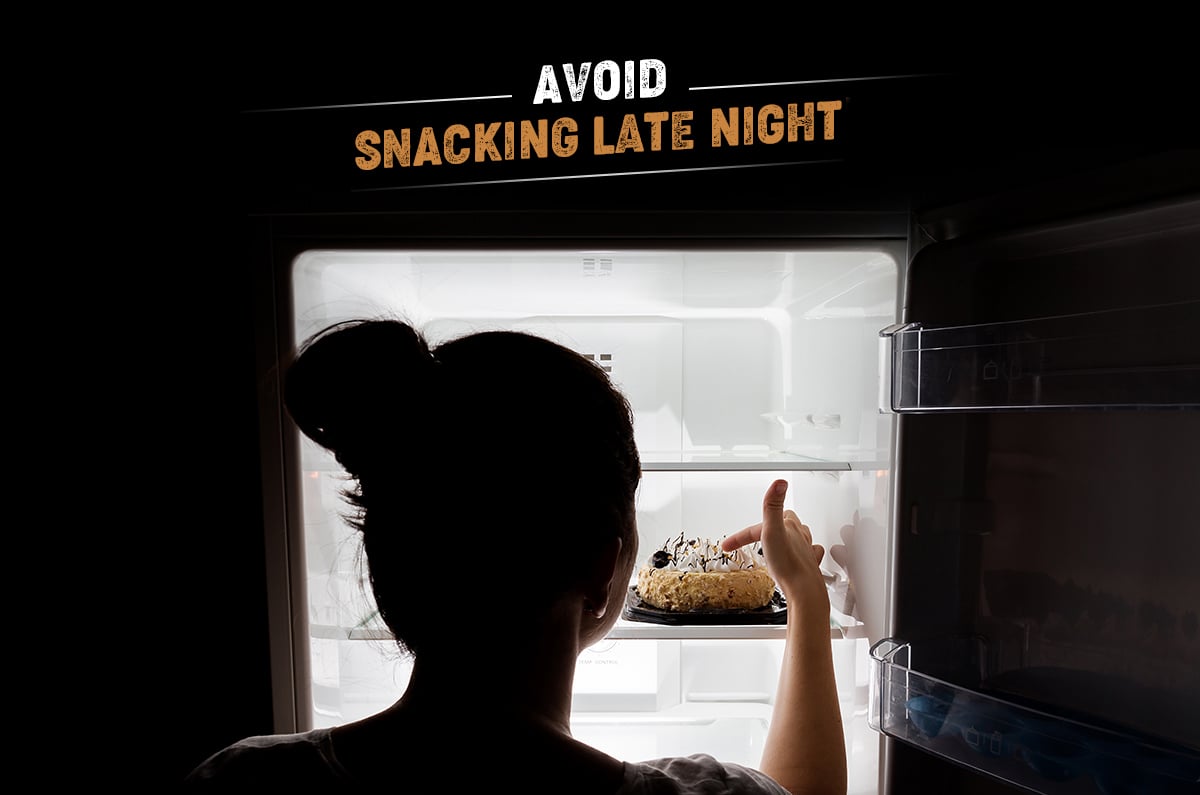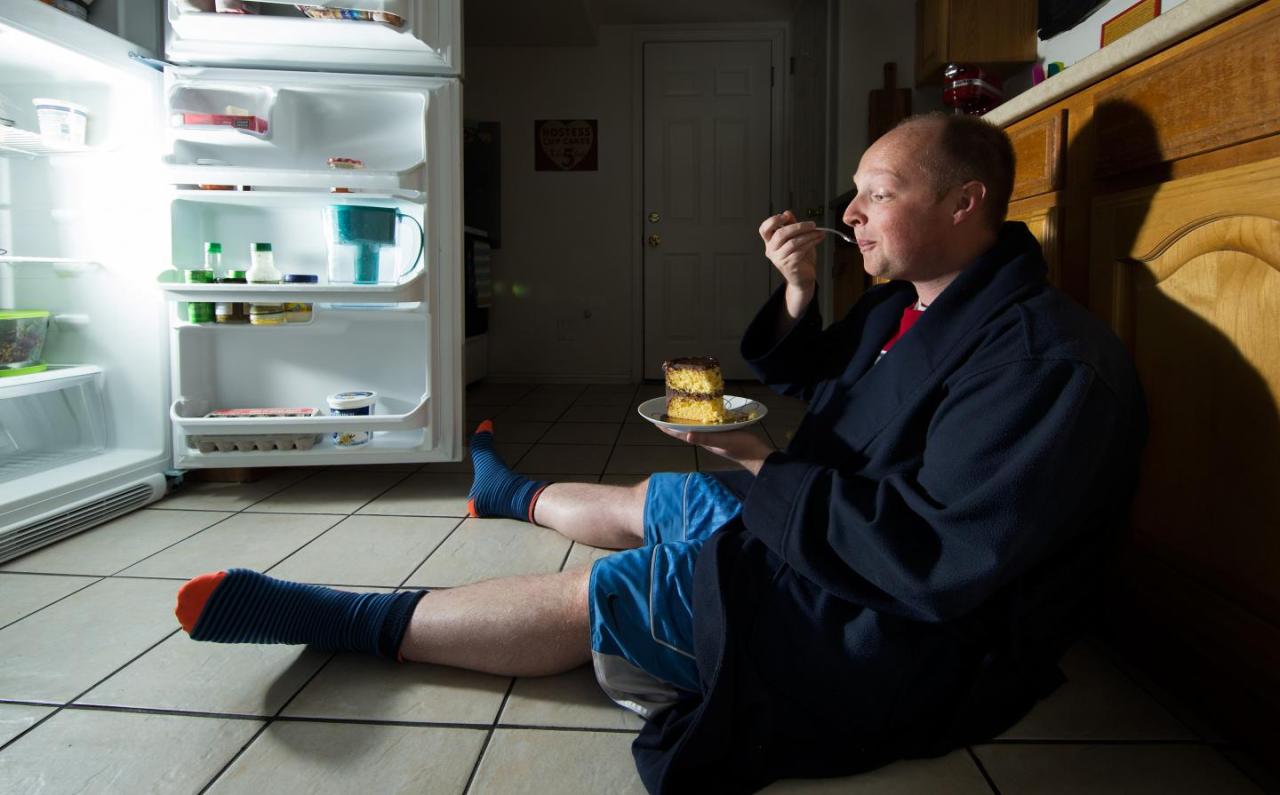How to avoid late night snacking is a common concern for many individuals seeking to improve their health and well-being. Understanding the underlying reasons behind late night eating habits can help develop effective strategies to manage and reduce this behavior. By addressing psychological triggers, environmental factors, and lifestyle habits, it is possible to establish healthier routines that promote better sleep and digestion, ultimately contributing to long-term health benefits.
This comprehensive approach involves recognizing emotional and physiological cues, replacing unhealthy snacks with nutritious alternatives, and creating a supportive environment to minimize temptations. Implementing these practices not only curbs late night cravings but also fosters a more balanced and mindful lifestyle.
Understanding Late Night Snacking

Late night snacking is a common behavior observed across different age groups and lifestyles. While it may seem harmless or even satisfying in the moment, understanding the underlying psychological and physiological factors that drive this habit is essential for managing it effectively. Recognizing the triggers and typical food choices associated with late night eating can help develop healthier habits and prevent related health issues.
Many individuals find themselves reaching for snacks during late hours due to a complex interplay of emotional, biological, and environmental influences. These behaviors often stem from stress, boredom, or disrupted daily routines. Moreover, the types of foods consumed late at night tend to be high in sugar, salt, or fat, which can further impact sleep quality and overall health. Gaining insight into these aspects provides a clearer picture of why late night snacking occurs and how to address it constructively.
Psychological and Physiological Reasons Behind Late Night Snacking
Understanding the motivations behind late night snacking involves examining both the psychological and physiological factors that influence this behavior. These reasons are often interconnected, making it important to address both aspects for effective management.
- Psychological Factors: Emotional states such as stress, anxiety, depression, or loneliness can trigger late night eating as a form of comfort or emotional relief. Boredom or habitual routines may also lead individuals to seek out food during late hours, even in the absence of physical hunger. For many, eating becomes a coping mechanism to deal with negative feelings or to fill a void when other activities are unavailable or unfulfilling.
- Physiological Factors: The body’s internal clock, or circadian rhythm, influences hunger and digestion patterns. Disruptions to sleep schedules or irregular eating habits can cause hormonal imbalances, notably in ghrelin (hunger hormone) and leptin (satiety hormone), prompting increased appetite late at night. Additionally, low blood sugar levels after a day of fasting or skipping meals may induce hunger signals that lead to late night eating.
Common Triggers for Late Night Eating Habits
The propensity to indulge in late night snacking is often prompted by specific triggers that can be identified and addressed. Recognizing these triggers can be instrumental in developing strategies to curb the habit.
- Stress and Emotional Distress: High levels of stress, work-related or personal anxiety, and emotional fatigue can drive individuals to seek comfort in food during late hours. Eating becomes a temporary escape or a soothing activity, especially when other coping mechanisms are unavailable.
- Boredom and Routine: Repetitive evening routines or feelings of restlessness may lead to mindless snacking. Without engaging activities or hobbies, individuals may turn to food as a form of entertainment or distraction.
- Sleep Disruptions and Fatigue: Poor sleep quality or insufficient rest can alter hormonal balance, increasing hunger signals. Sleep deprivation also reduces the ability to resist cravings, making late-night snacking more likely.
- Environmental Cues: Accessibility of snacks, presence of television or digital devices, and social environments that promote late-night eating can act as external triggers. The availability of high-calorie, savory, or sugary foods further encourages consumption during late hours.
Typical Foods Consumed During Late Night Snacking
The foods chosen for late night snacking often reflect convenience, taste preferences, and emotional states. They tend to be calorie-dense and easy to prepare, which can impact overall health if consumed frequently or in large quantities.
Many individuals prefer specific types of foods that provide immediate satisfaction or comfort, which may include:
| Food Category | Common Examples |
|---|---|
| Savory Snacks | Chips, popcorn, pretzels, cheese crackers, instant noodles |
| Sweet Treats | Chocolate bars, cookies, ice cream, candies, frosted cereals |
| High-Protein or Filling Foods | Peanut butter, nuts, cheese, Greek yogurt, protein bars |
| Comfort Foods | Pizza slices, fried foods, fried chicken, instant ramen |
Many late night snacks are chosen for their immediate gratification rather than nutritional value, which can lead to weight gain and disrupted sleep patterns over time.
Understanding these patterns and preferences helps in identifying healthier alternatives and managing late night cravings more effectively. A conscious approach to food choices during late hours can contribute significantly to overall well-being and better sleep hygiene.
Health Impacts of Late Night Snacking
Late night snacking, although common in many lifestyles, carries significant implications for overall health, especially when it becomes habitual. Understanding how late night eating affects the body can help in making informed choices to promote better health and well-being. The repercussions extend beyond immediate discomfort, impacting various physiological processes and long-term health outcomes.
Consuming food late at night can disrupt normal bodily functions, notably digestion and sleep quality. These disruptions may lead to adverse health effects that accumulate over time. Recognizing the short-term and long-term consequences of habitual late night snacking is essential in cultivating healthier habits and preventing chronic health issues.
Effects on Digestion and Sleep Quality
Eating late at night interferes with the natural digestive cycle, which is optimized when the body is preparing for rest. The stomach produces gastric acids and enzymes to digest food, and eating close to bedtime can lead to indigestion, acid reflux, and discomfort during sleep. This can result in fragmented sleep patterns and decreased sleep quality, which in turn affects overall health.
Poor sleep caused by late night eating can impair metabolic processes, hormone regulation, and immune function. When the body is busy digesting food, it does not reach the restorative deep sleep stages as effectively, leading to fatigue, reduced concentration, and increased stress levels the following day.
Short-term vs. Long-term Health Consequences
The impact of late night snacking varies based on frequency and individual health status. Short-term effects include immediate issues such as bloating, indigestion, and disturbed sleep, which can lead to daytime drowsiness and decreased productivity. Over time, habitual late night eating may contribute to more serious health problems.
Long-term health consequences involve increased risks of obesity, metabolic syndrome, type 2 diabetes, and cardiovascular diseases. Excess caloric intake during late hours often leads to weight gain, especially around the abdomen, which is associated with heightened health risks. Additionally, persistent disruptions in circadian rhythms can impair glucose metabolism and lipid profiles, further elevating disease susceptibility.
Benefits of Avoiding Late Night Snacks
| Health Benefits | Examples | Methods | Notes |
|---|---|---|---|
| Improved Digestion | Reduced acid reflux, less bloating | Eat dinner earlier, avoid heavy or spicy foods at night | Helps prevent gastrointestinal discomfort and promotes better nutrient absorption |
| Enhanced Sleep Quality | Deeper, uninterrupted sleep cycles | Limit late-evening food intake, opt for light snacks if necessary | Supports circadian rhythm regulation and restorative sleep stages |
| Weight Management | Reduced calorie intake, healthier body composition | Plan meals to meet daily caloric needs earlier in the day | Minimizes late-night cravings and overeating tendencies |
| Lower Risk of Chronic Diseases | Decreased likelihood of obesity, diabetes, heart disease | Establish consistent eating schedules, prioritize balanced meals | Consistent habits help maintain metabolic health over time |
Strategies to Prevent Late Night Snacking

Late night snacking can often become a habitual behavior that interferes with sleep quality and overall health. Implementing effective strategies to curb this tendency is essential for maintaining a balanced diet and promoting better sleep patterns. By adopting practical behavioral techniques and establishing a structured evening routine, individuals can significantly reduce the inclination toward late night eating and foster healthier habits.
Preventing late night snacking involves understanding personal triggers and replacing unproductive habits with healthier alternatives. It requires a combination of behavioral awareness, emotional regulation, and routine management. Below are comprehensive strategies designed to help individuals develop a proactive approach toward managing late night eating tendencies.
Behavioral Techniques to Curb Late Night Eating
Adopting behavioral modifications can effectively reduce late night snacking. These techniques focus on reshaping habits and establishing mindful eating practices.
- Maintain Regular Meal Times: Consuming balanced meals at consistent times throughout the day helps prevent excessive hunger late at night, reducing the urge to snack impulsively.
- Stay Hydrated: Drinking a glass of water or herbal tea in the evening can help curb false hunger signals and promote satiety without adding calories.
- Implement Portion Control: Keeping tempting snacks out of immediate reach or pre-portioning treats can prevent overeating during late hours.
- Develop Self-awareness: Recognize patterns or specific situations that trigger late night snacking, such as boredom or stress, and address these factors proactively.
- Practice Mindful Eating: Focus on eating slowly and savoring each bite to enhance feelings of fullness and reduce the likelihood of overeating.
Replacing Late Night Snacks with Healthier Alternatives
Establishing a step-by-step routine to substitute unhealthy late night snacks with nutritious options can promote better digestion and overall health.
- Identify Healthy Substitutes: Stock up on options like Greek yogurt, fresh fruit, nuts in moderation, herbal teas, or vegetable sticks with hummus.
- Create a Routine: Before the usual snacking time, prepare and set out healthy alternatives to make them easily accessible when cravings hit.
- Gradually Transition: Reduce the intake of high-calorie snacks over time while increasing the consumption of healthier choices to adjust taste preferences.
- Incorporate Hydrating Beverages: Drinking flavored water or herbal infusions can satisfy the desire for a comforting routine without added calories.
- Practice Mindful Substitution: When craving a snack, pause and choose a nutritious alternative, paying attention to the sensory experience and fullness cues.
Managing Emotional Triggers for Late Night Snacking
Emotional states such as stress, boredom, or loneliness are common triggers for late night eating. Recognizing and managing these triggers is crucial for establishing healthier habits.
Emotional eating often serves as a coping mechanism. Developing alternative stress-relief strategies can significantly reduce late night snacking.
- Identify Emotional Signals: Keep a journal to track feelings and situations that prompt late night snacking, fostering awareness and accountability.
- Develop Stress-Reduction Techniques: Engage in relaxation methods such as deep breathing, meditation, or gentle yoga to manage emotional triggers without resorting to food.
- Engage in Alternative Activities: Occupy your mind with hobbies, reading, or light physical activity to divert attention from snacking urges.
- Seek Support: Talk to friends, family, or mental health professionals when emotional distress consistently triggers late night eating, and explore coping mechanisms together.
- Practice Self-Compassion: Avoid guilt or self-criticism following emotional eating episodes; instead, approach these moments with understanding and a plan for future prevention.
Establishing a Consistent Evening Routine
A well-structured evening routine can create a mental and physical environment that discourages late night eating. Establishing predictable habits enhances sleep quality and reduces the likelihood of impulsive snacking.
- Create a Wind-Down Schedule: Dedicate the last hour before bedtime to relaxing activities such as reading, stretching, or listening to calming music.
- Avoid Stimulating Activities: Limit screen time and exposure to bright lights, which can interfere with sleep hormones and increase cravings.
- Set a Fixed Bedtime: Going to bed at the same time each night helps regulate internal circadian rhythms and reduces late night hunger signals.
- Plan Evening Meals Carefully: Ensure dinner is satisfying and consumed at least a couple of hours before bedtime to minimize late night hunger.
- Practice Relaxation Techniques: Incorporate mindfulness, meditation, or deep breathing exercises to promote calmness and signal to your body that it’s time to rest.
Healthy Alternatives and Substitutes

Choosing nutritious snacks that satisfy late-night cravings can be instrumental in maintaining a balanced diet and preventing unnecessary calorie intake. Instead of reaching for high-calorie, processed foods, opting for healthful substitutes can help manage hunger and support overall well-being.
Incorporating these alternatives into your nightly routine can foster healthier habits and reduce the tendency to overeat or indulge in less nutritious options. Properly prepared and thoughtfully selected snacks can become a satisfying and beneficial part of your evening.
Nutritious Snacks as Healthy Substitutes for Late Night Cravings
When cravings strike late at night, it is common to seek comfort foods that are often high in sugar, salt, or unhealthy fats. However, there are numerous wholesome options that can satisfy these cravings without compromising health goals. These snacks are rich in nutrients, low in empty calories, and easy to prepare, making them ideal choices for a late-night routine.
Below is a responsive table organizing some effective snack alternatives, highlighting their benefits, preparation tips, and suitable occasions for consumption. This organized approach helps in selecting the best options tailored to individual preferences and needs.
| Snack Type | Benefits | Preparation Tips | Suitable Occasions |
|---|---|---|---|
| Greek Yogurt with Berries | Rich in protein and antioxidants, supports digestive health, and keeps you full longer. | Mix a few fresh or frozen berries into a bowl of plain Greek yogurt. Optional: add a drizzle of honey for sweetness. | A light, satisfying option after dinner or during late-night relaxation. |
| Nuts and Seeds | Provide healthy fats, fiber, and protein; aids in satiety and energy stabilization. | Portion a small handful (about 1 oz) of almonds, walnuts, or sunflower seeds. Avoid salted or flavored varieties. | Perfect as a quick snack when craving crunch or for a small energy boost. |
| Sliced Vegetables with Hummus | Low in calories, high in fiber and essential nutrients, and satisfying crunchy texture. | Slice cucumbers, carrots, or bell peppers and serve with a couple of tablespoons of hummus. | Ideal for a savory craving or as a light, nutritious snack before sleep. |
| Banana with Nut Butter | Provides potassium, healthy fats, and protein; helps curb sweet cravings healthily. | Sliced banana topped with a teaspoon of almond or peanut butter. For variety, sprinkle with chia seeds. | Suitable when craving something sweet but nutritious during late hours. |
| Air-Popped Popcorn | Low-calorie, high fiber, and satisfying crunch that can curb hunger effectively. | Pop popcorn using an air popper or on the stovetop without oil. Season with herbs or a small amount of sea salt. | A great option for movie nights or relaxing evenings at home. |
Incorporating these healthy alternatives into your late-night routine involves simple preparation and mindful portioning. For example, preparing a bowl of Greek yogurt with berries or slicing vegetables with hummus in advance can make these options readily available when cravings hit. Keeping portion sizes moderate prevents overeating while still satisfying the desire for a tasty snack. By choosing nutritious substitutes, you can enjoy the comfort of late-night snacking without compromising your health goals.
Lifestyle and Environment Adjustments

Implementing effective lifestyle and environmental modifications can significantly diminish the likelihood of late night snacking. These adjustments not only support healthier eating habits but also contribute to overall well-being by fostering a more structured and mindful approach to daily routines. By optimizing sleep patterns, increasing daytime activities, and creating a conducive environment, one can establish sustainable habits that naturally reduce late night cravings.
These strategies help reinforce the body’s natural circadian rhythms, promote satiety during waking hours, and minimize exposure to temptations that lead to unnecessary snacking during late hours. Incorporating such changes requires awareness and consistency but can ultimately lead to healthier habits and improved sleep quality.
Sleep Hygiene and Daytime Activities
Quality sleep hygiene and engaging in ample daytime physical activity are pivotal factors influencing late night snacking behaviors. Poor sleep quality or insufficient sleep can disrupt hormonal balances, notably increasing ghrelin levels (which stimulate appetite) and decreasing leptin (which signals fullness). This imbalance often results in heightened hunger during late hours.
Conversely, maintaining a consistent sleep schedule, avoiding screens before bedtime, and creating a relaxing sleep environment support restorative sleep cycles. Additionally, engaging in regular daytime physical activity helps regulate appetite hormones, improves mood, and reduces stress levels—all of which can decrease the desire for late night snacking.
Environmental Modifications to Reduce Temptations
The physical surroundings play a crucial role in influencing snacking behaviors. Reducing exposure to temptations involves strategic environmental changes that make unhealthy snacks less accessible or visible. Such modifications include:
- Keeping tempting snacks out of sight, such as in closed cabinets rather than on countertops or in easily accessible locations.
- Replacing unhealthy snack options with healthier alternatives within easy reach to encourage better choices when cravings arise.
- Implementing portion control by storing snacks in smaller containers to prevent overeating.
- Creating a calming and clutter-free bedroom environment that discourages mindless eating or late night snacking as a source of comfort or distraction.
“Removing tempting foods from immediate visibility reduces spontaneous snacking, especially during late hours when willpower wanes.”
Meal Planning and Calorie Distribution
Effective meal planning ensures that calorie intake is balanced throughout the day, minimizing the likelihood of late night hunger. By strategically distributing meals and snacks, individuals can sustain satiety and prevent impulsive snacking during late hours. Techniques include:
- Consuming balanced meals rich in protein, fiber, and healthy fats, which promote prolonged fullness.
- Planning regular, smaller meals at consistent intervals to maintain steady blood sugar levels and reduce hunger spikes.
- Including nutrient-dense snacks during the day to satisfy cravings without excessive calorie intake, thereby decreasing the desire for late night eating.
- Setting meal times aligned with circadian rhythms to reinforce natural hunger cues and improve digestion.
Proper meal planning not only supports weight management but also stabilizes energy levels throughout the day, making late night snacking less appealing or unnecessary.
Monitoring and Maintaining Progress

Maintaining control over late-night snacking habits requires consistent monitoring to identify patterns and sustain positive change. Tracking your behavior over time enables you to recognize triggers, understand emotional influences, and evaluate the effectiveness of your strategies. This ongoing process is vital to ensuring that healthy habits become ingrained, and setbacks are managed effectively, fostering long-term success in reducing late-night eating.Effective monitoring involves regular self-assessment and documentation, which provides tangible insights into your progress.
It also helps in adjusting strategies as needed and reinforcing motivation by highlighting achievements, no matter how small. By establishing a system to observe and reflect on your habits, you set a foundation for sustainable behavioral change and resilience against setbacks.
Methods for Tracking Late Night Snacking Habits
To gain a clear picture of your late-night snacking behaviors, employ various tracking techniques that suit your lifestyle. Consistent recording allows for data collection, which can then be analyzed to identify patterns, triggers, and emotional states associated with late-night eating episodes.Some effective methods include:
- Food Diaries: Maintain a daily journal where you note the time, type of snack consumed, portion size, and context of eating. This helps in spotting recurring triggers or times of increased vulnerability.
- Mobile Apps: Utilize diet and habit-tracking applications that offer prompts and reminders, making data entry quick and accessible. Apps often provide visual graphs for easy interpretation of your progress.
- Habit Trackers and Charts: Use printable templates or digital spreadsheets to record each instance of late-night snacking, including details about your emotional state or environment at the time.
To enhance tracking, consider including specific columns for noting the triggers—such as stress, boredom, or fatigue—and recording your emotional or physical states, such as anxiety levels or hunger intensity. Over time, this comprehensive data helps identify patterns that warrant targeted interventions.
Sample Templates and Charts for Recording Habits
Structured record-keeping tools facilitate consistent documentation and analysis of late-night snacking behaviors. Below are examples of simple templates and charts designed to capture key information:
| Date | Time | Snack Consumed | Portion Size | Trigger/Context | Emotional State | Notes |
|---|---|---|---|---|---|---|
| 2024-04-20 | 10:30 PM | Chocolate bar | 1 serving | Boredom after work | Relaxed but restless | Felt a craving after scrolling social media |
| 2024-04-21 | 11:00 PM | Bag of chips | Small handful | Stress from upcoming exam | Anxious and fatigued | Used to distract from anxiety |
Alternatively, a simple chart can be created as a visual tool, with columns for date, triggers, emotional states, and notes. Regular review of this data strengthens self-awareness and allows for tailored adjustments in your behavior.
Consistency in tracking fosters self-awareness, which is essential for behavioral change. Recognizing patterns early enables targeted strategies to prevent relapse and maintain progress.
Strategies for Maintaining Motivation and Managing Setbacks
Sustaining motivation is critical to long-term success in avoiding late-night snacking. It involves cultivating resilience, celebrating progress, and employing practical techniques to handle setbacks effectively.Key tips include:
- Set Realistic Goals: Establish achievable milestones, such as reducing late-night snacking frequency gradually, to maintain motivation without feeling overwhelmed.
- Celebrate Small Wins: Acknowledge progress, such as a week without late-night eating, to reinforce positive behavior and boost confidence.
- Develop a Support System: Share your goals with friends, family, or support groups who can encourage accountability and provide emotional support during challenging times.
- Implement Coping Strategies: When setbacks occur, employ techniques such as deep breathing, mindfulness, or engaging in a different activity to manage cravings and emotional triggers.
- Review and Adjust Plans: Regularly assess your tracking data and modify strategies as needed, recognizing that setbacks are part of the behavioral change process.
Keeping a compassionate perspective towards yourself helps maintain motivation. Understand that slip-ups are normal and serve as opportunities to learn and strengthen your commitment. Maintaining a positive outlook and focusing on progress rather than perfection fortifies your resolve to sustain healthier habits over time.
Wrap-Up
In conclusion, mastering how to avoid late night snacking requires a combination of awareness, strategic planning, and lifestyle adjustments. By understanding triggers, choosing healthy substitutes, and maintaining consistent routines, individuals can significantly improve their overall health and sleep quality. Staying motivated and adaptable throughout the journey will ensure lasting success and contribute to a healthier, more energized life.